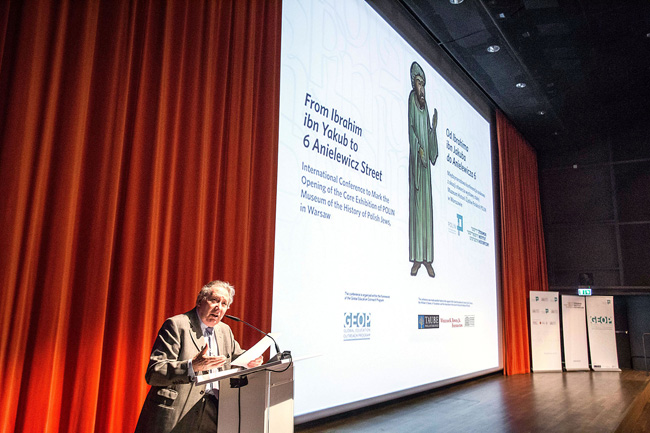
Inaugural International Scholars Conference at POLIN Museum Spotlights Core Exhibition.
On May 11-14, 2015, the POLIN Museum of the History of Polish Jews and its co-host, the Emanuel Ringelblum Jewish Historical Institute, welcomed over 350 scholars and experts from America, Europe, and Israel to their inaugural international conference, "From Ibrahim ibn Yakub to 6 Anielewicz Street." At this historic international gathering – the first global Polish Jewish studies meeting in 75 years -- the Museum introduced its core exhibition to the scholarly public and invited discussions on future directions in Polish Jewish studies scholarship.
The conference was organized within the POLIN Museum’s Global Education Outreach Program and was generously supported by the William K. Bowes, Jr. Foundation, the Taube Foundation for Jewish Life & Culture, and the Association of the Jewish Historical Institute of Poland.
At the conference, the scholars responsible for the Core Exhibition presented its main principles and the challenges of working as a historian on an exhibition intended for broad and diverse audiences. During the panels that followed, scholars assessed the state of the field of Polish Jewish studies and set out directions for future research and international collaboration. POLIN Museum and the Jewish Historical Institute aim to play vital roles in supporting these developments.
Among the scholarly issues discussed was, generally speaking, the transformation of the historiography of Polish Jewry in the last 30 years. More specifically panel discussions examined (1) the changes in the legal situation of Jews in the Polish-Lithuanian Commonwealth and their role in its economic life; and (2) the problems inherent in the transformation of Jews from a religious and cultural community linked by a common faith into citizens or subjects of their respective countries in the context of 19th century partitioned Poland. In addition, lively debates addressed the deterioration of the political, economic and social situation in Poland in the late 1930s and the extent to which these conditions facilitated the Nazi genocidal plan. Another exciting discussion explored how Jewish life was reconstructed in the immediate post-WWII years in the face of the difficult conditions created by the imposition of an unpopular communist regime and the violence, often directed against Jews.
One very productive roundtable brought together scholars involved in other museums and scholarly entities, among them YIVO, the Jewish Museum in Moscow, the Museum in Kraków in the former Oskar Schindler factory, the Galicia Jewish Museum, and the Museum of the History of the Second World War in Gdansk. Another allowed leading figures from the Centre for the Study of the History and Culture of Polish Jews at Hebrew University, the United States Holocaust Memorial Museum, and the National Museum of American Jewish History in Philadelphia to share their experiences with the POLIN Museum and to offer suggestions for future joint projects.
The proceedings of the conference will be posted on the websites of the POLIN Museum and the Jewish Historical Institute. In addition, a one-volume publication of conference papers will be published, which will reflect the present state of knowledge in the field and discuss areas where further research is needed.
CONFERENCE TESTIMONIALS:
-- Dr. Dariusz Stola, Director, POLIN Museum of the History of Polish Jews
-- Prof. Barbara Kirshenblatt-Gimblett, Chief Curator, Core Exhibition, POLIN Museum
-- Shana Penn, Executive Director, Taube Philanthropies; POLIN Museum Council
